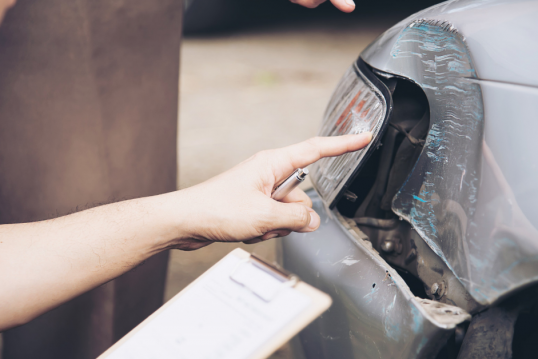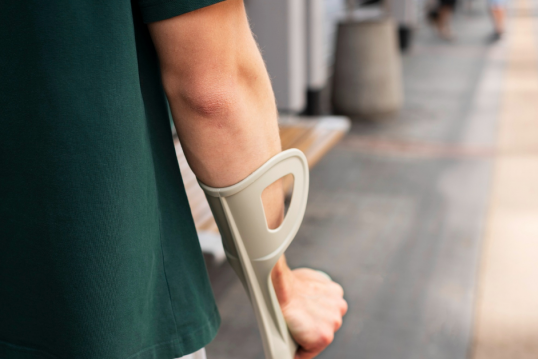Rideshare services like Uber and Lyft have become a part of everyday life for both tourists and locals in Las Vegas. With so many rideshare vehicles on the roads at virtually all times of the day, accidents are bound to happen.
When an accident does happen, determining who can be held liable can be trickier than liability for other types of car accidents. Was the Uber driver at fault? What if the other driver caused the crash? Can the rideshare company itself ever take the blame?
The answers depend on numerous factors, such as whether the driver had the app on or was in the middle of a ride. These unique factors make rideshare accident cases more complicated than your average car accident.
At the Cottle Firm, our team of dedicated Las Vegas car accident lawyers has experience in all types of auto accident cases, including rideshare accident claims. We’re prepared to evaluate your case and help you determine the best course of action. Give us a call today at 702-722-6111 to discuss your Las Vegas rideshare accident claim in a free consultation.
How the Rideshare Model Works
If you want to know how liability works for rideshare accidents, it helps to first understand how rideshare companies like Uber and Lyft operate. Their business models are structured very differently from traditional taxi companies, and those differences can have major legal implications when an accident occurs and another party wishes to file a personal injury claim.
Drivers as Independent Contractors
Uber and Lyft drivers are not considered employees under state and federal laws. Instead, they are classified as independent contractors. This classification limits the companies’ legal exposure because they are not technically responsible for many of the actions of their drivers.
That said, courts and lawmakers in some jurisdictions have challenged this model by arguing that the companies exert enough control over drivers to be treated as employers. The California Supreme Court recently heard such a case and ruled that these companies may continue classifying their drivers as independent contractors. However, this remains a contested issue and could change in the future.
Use of Personal Vehicles
Rideshare drivers use their own personal vehicles rather than cars owned and maintained by Uber or Lyft. This has major insurance implications. Commercial vehicles often carry large insurance policies covered by the company, while personal vehicles often have minimal liability protection. However, Uber and Lyft do provide insurance coverage for drivers while they are on the clock.
App-Based Service
These services are entirely based on apps, which handle everything from ride requests to payments to communication between riders and drivers. This structure also creates unique liability considerations. Uber and Lyft’s insurance policies are generally based on the driver’s status within the app: whether the driver is logged in, waiting for a ride, en route to pick up a passenger, or actively transporting one.
Common Causes of Rideshare Accidents in Las Vegas
With so much activity on Las Vegas roads, it’s no surprise that accidents involving Uber and Lyft are more common than many people realize. Some crashes are caused by rideshare drivers, while others happen due to negligence by other drivers or other factors, such as dangerous road conditions. Here are some of the most common reasons these accidents occur in and around Las Vegas.
Distracted Driving
Rideshare drivers rely heavily on their phones and apps to do their jobs. They’re constantly checking for ride requests, using navigation systems, and communicating with passengers. That kind of multitasking can take their attention away from the road. With such heavy and unpredictable traffic in Las Vegas, even a quick glance at a screen can lead to a serious accident.
Driver Fatigue
Drowsy driving is a real danger. According to the Centers for Disease Control and Prevention (CDC), driving after being awake for more than 17 hours is similar to driving with a BAC of 0.05%. Many Uber and Lyft drivers work long hours, often as a second job or overnight when demand is high. A tired driver may have slower reaction times or even fall asleep at the wheel, putting everyone on the road at risk.
Speeding and Reckless Driving
Trying to arrive before the estimated arrival or get to the next fare can lead some drivers to speed or make aggressive moves in traffic. This is especially risky on the Strip, where pedestrians, tour buses, and taxis all fight for space. Crashes become more likely when drivers engage in reckless driving, such as weaving through traffic, making unsafe lane changes, or running red lights.
Drunk Driving by Other Motorists
Las Vegas is known for its world-famous party scene. Unfortunately, this means impaired drivers are a common hazard. Even if a rideshare driver is sober and drives carefully, they can still be hit by another driver who is under the influence. In these cases, the drunk driver is typically considered at fault. However, the rideshare driver will also be evaluated for fault under Nevada’s comparative negligence law (NRS 41.141).
Determining Liability for a Rideshare Accident
Figuring out who’s responsible for a rideshare accident isn’t always straightforward. In a regular car crash, liability is determined after evaluating each party for their degree of fault. But when a rideshare vehicle is involved, liability can get more complicated.
Nevada’s Comparative Negligence System
Nevada follows a modified comparative negligence system. That means each party involved in a crash is evaluated for fault and assigned a percentage of negligence. Your ability to recover compensation depends on your share of the blame. Even if you were partially at fault, you can still seek compensation as long as you were less than 50% at fault.
When the Rideshare Driver is at Fault
If the rideshare accident was caused by negligence by the rideshare driver, such as speeding or distracted driving, the driver can be held liable. Depending on whether the driver was on the clock at the time of the accident, different insurance policies may apply. If the driver wasn’t logged into the app, their personal car insurance will go into effect. If they were logged in or had a passenger, Uber or Lyft’s insurance might step in.
When Another Driver is at Fault
Sometimes the Uber or Lyft driver isn’t to blame. If another vehicle causes an accident through negligence, such as running a red light or driving under the influence, that driver and their insurance provider would be responsible for damages. Passengers in the rideshare vehicle can file personal injury claims against the at-fault driver just like they would in any other accident.
Shared Liability
In many cases, more than one party may share liability. For example, the rideshare driver might have been speeding, but another driver may have made an illegal turn. When multiple parties are at fault, insurance companies will assign percentages of liability, and compensation will be divided accordingly. This can make the claims process more complex, especially when several insurance providers are involved.
Pedestrian and Cyclist Accidents
If a rideshare vehicle hits a pedestrian or cyclist, liability is usually determined based on the same principles. If the rideshare driver caused the crash, the injured person may be able to file a claim against the driver’s insurance, and possibly Uber or Lyft’s policy. However, if the pedestrian or cyclist was acting negligently (for example, by ignoring a traffic signal), they could share some of the blame.
How Insurance Coverage Works for Rideshare Accidents
Determining which insurance policy applies for a rideshare accident depends on the driver’s status at the time of the incident. Nevada law outlines specific insurance requirements for Transportation Network Companies (TNCs) like Uber and Lyft. Coverage varies based on whether the driver is offline, awaiting a ride request, or actively transporting a passenger.
Driver Offline: Personal Insurance Applies
If the driver wasn’t using the app at the time of the crash, the accident is treated just like any other involving a private vehicle. In this case, only the driver’s personal auto insurance applies, and Uber or Lyft won’t provide any coverage.
App On, No Ride Accepted: Contingent Coverage
If the driver was logged into the app and waiting for a ride request, Uber and Lyft provide limited liability coverage. In Nevada, this typically includes:
- Up to $50,000 for bodily injury per person
- Up to $100,000 total for bodily injury per accident
- Up to $25,000 for property damage
This coverage is only secondary, meaning it only kicks in if the driver’s personal insurance policy doesn’t fully cover the damages.
Ride Accepted or Passenger Onboard: Full Coverage
Once a driver accepts a ride and until the passenger is dropped off, Uber and Lyft provide commercial insurance coverage. This includes up to $1 million in liability coverage, as well as uninsured/underinsured motorist coverage in case the other driver doesn’t have enough insurance. This is the highest level of protection, and it applies whether the passenger is in the car or the driver is en route to a pickup.
Passenger Injury Claims
If you’re a passenger injured in a rideshare accident, you’re likely covered under Uber or Lyft’s $1 million policy, assuming the driver was actively completing a trip. You can file a claim regardless of which driver was at fault. However, you may need to deal with multiple insurers depending on how the accident happened.
What to Do After a Rideshare Accident in Las Vegas
The steps you take in the aftermath of a rideshare accident can make a big difference in protecting your health, your legal rights, and your ability to pursue financial compensation. Here are some steps to take right away if you’re in an Uber or Lyft crash in Las Vegas.
Call 911 and Get Medical Attention
First and foremost, call 911. Even if you feel fine, you need to be evaluated for injuries. Some injuries (like concussions or internal trauma) might not show immediate symptoms. A police report and medical records will also serve as key documentation for any legal or insurance claims you make later on.
Document the Scene
If you’re able, take photos of everything: vehicle damage, license plates, the surrounding area, and any visible injuries. Try to capture the position of the cars before they’re moved. These photos can be important evidence if there’s a dispute over who caused the crash.
Get Contact Information
Exchange contact and insurance information with all drivers involved, including the rideshare driver. Don’t forget to also get the names and contact info of any witnesses. If you’re a passenger, note the driver’s name and confirm they were logged into the rideshare app. Screenshots of your ride receipt or in-app trip details may also be relevant.
Report the Accident to Uber or Lyft
Use the app to report the crash directly to Uber or Lyft. Both companies have in-app tools for reporting accidents, and doing so quickly helps ensure the accident is documented. They may also begin the insurance claims process from their end.
Avoid Giving Recorded Statements
You may be contacted by the insurance companies, including the rideshare company’s insurer or another driver’s insurer. Avoid giving a recorded statement or accepting a settlement offer without speaking to a Las Vegas personal injury attorney first. Insurance companies are typically more concerned with limiting payouts than helping you recover the damages you deserve.
Speak with a Personal Injury Lawyer
Rideshare accident claims can get complicated fast, especially when multiple insurance policies are involved. A Las Vegas car accident lawyer can guide you through the legal process, negotiate with insurers, and determine whether you’re eligible for compensation for medical bills, lost income, pain and suffering, and other damages.
Legal Options for Injured Passengers, Pedestrians, and Other Drivers
If you’re injured in a rideshare crash in Las Vegas as a passenger, pedestrian, or another driver, you may be entitled to compensation. Rideshare passengers are typically covered under Uber or Lyft’s insurance policy. Pedestrians and other drivers may file claims against the rideshare driver’s personal or commercial coverage, depending on whether the app was active.
If the insurance doesn’t fully cover your losses or denies your claim, you may be able to file a personal injury lawsuit. An experienced Las Vegas car accident attorney can help you pursue full compensation for your injuries.
Discuss Your Rideshare Accident Claim with a Las Vegas Car Accident Lawyer
Have you recently been injured in a rideshare accident in Las Vegas? You deserve compensation for your medical bills, lost wages, pain and suffering, and any other damages related to your injuries. At the Cottle Firm, our Las Vegas car accident lawyers take pride in helping our clients seek the compensation they deserve for injuries caused by negligence. Contact us today at 702-722-6111 to discuss your case in a free consultation.
Related: Las Vegas Bus Accident Lawyers
Las Vegas Shuttle & Taxis Accident Injury Lawyers
How to Negotiate with Insurance Companies After a Henderson Car Accident
Airbnb & Short-Term Rental Injuries in Vegas: Who’s Responsible and How to Prove It









